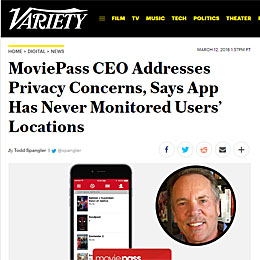


How to Shoot Yourself in the Foot with the Media in One Easy Step
[by Howard Fencl, Hennes Communications]
Education Secretary Betsy DeVos stumbles through an interview with 60 Minutes veteran Lesley Stahl, seemingly ignorant to basic facts about U.S. public schools. She blows the perfect opportunity to “up” her embattled reputation with the enormous audience the program always delivers. Later, she issues tweets bemoaning the report saying Stahl left out information DeVos shared about Michigan Schools. So why did this happen?
Mitch Lowe, the CEO of MoviePass, which gives you unlimited access to movies in theaters for a monthly subscription fee, proclaims to an entertainment industry conference that the company’s app spies on your every move: “We get an enormous amount of information in your GPS by the phone … so we watch how you drive from home to the movies. We watch where you go afterwards, and so we know the movies you watch. We know all about you.” After an avalanche of media coverage and social media doomsaying, Lowe has his company re-engineer the app to remove background tracking capabilities and issues an apology. So why did this happen?
Both gaffes have one critical flaw: lack of preparation.
If you know you’re going to be on the other side of a microphone – particularly when the mic belongs to 60 Minutes – or you’re going to be keynoting at a conference teeming with industry media, you will flame out and fall off the cliff if you don’t put in a ton of prep time. You owe it to your audience. You owe it to your reputation.
In Secretary DeVos’ case, it’s not as if she is unaware of the criticism that focuses on her lack of experience in public schools. Did she sit down and spool out all the tough questions she might be asked in the interview? When you do this, it compels you to dig deep into your subject matter so you can best answer the ugly questions you anticipate. It informs your answers and positions you as a subject matter expert. And to her point that Stahl left out information DeVos shared, did the Secretary walk into the interview armed with messages she wanted to get across to the viewing audience – and the social media audience that followed? When you have quotable, memorable messages and repeat them frequently in an interview, you dramatically increase the chance that they will survive the reporter’s editing process and reach the audience.
In Mitch Lowe’s case, his apology states he was “joking around.” Did he take into account that a troop of tech media would be covering the conference and might take him at his word? They did. And even if tech reporters “got” the joke, did he consider that people seeing their coverage in newspapers, on TV and on the web might think he was serious? They did.
Both DeVos and Lowe have spoken in public and done interviews – plenty of times. It doesn’t matter. Both would have benefited from executive communications training. It’s always smart – and strategic – to have a third party help you navigate the preparation process. You get a fresh, outside perspective. You get insights you may not have considered. You get grilled on camera so you’re ready for the worst a reporter – or your audience – may throw at you.
Bottom line: Prepare. Have messages. Deliver messages early and often. Anticipate prickly questions. Have answers for those questions ready to go. And, please, leave the jokes to the comedians.
###